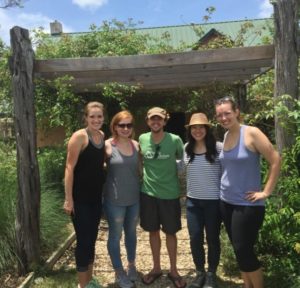by Alyssa Holloway
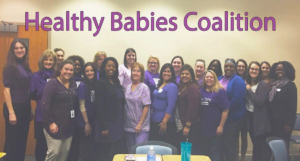 As one of the graduate assistants on the Healthy Babies Coalition in Waco, I have had the amazing opportunity of serving this growing community alongside organizations and agencies devoted to the health of women and children. These agencies truly make up the backbone of Waco. They work hard without the publicity, fame, or acknowledgment they deserve. The Healthy Babies Coalition started from the Healthy Texas Babies Initiative, an initiative of the Texas Department of State Health Services developed to help Texas communities lower their infant mortality rates. Waco is in the top 10% of highest infant mortality rates in Texas, and the Healthy Babies Coalition is determined to fight these terrible odds. Our community initiative includes partnering with agencies to create a plan for inter-conception health information to be provided to clients, encouraging the creation of a reproductive life plan with clients, as well as encouraging clients to see their physicians and enter in to early prenatal care.
As one of the graduate assistants on the Healthy Babies Coalition in Waco, I have had the amazing opportunity of serving this growing community alongside organizations and agencies devoted to the health of women and children. These agencies truly make up the backbone of Waco. They work hard without the publicity, fame, or acknowledgment they deserve. The Healthy Babies Coalition started from the Healthy Texas Babies Initiative, an initiative of the Texas Department of State Health Services developed to help Texas communities lower their infant mortality rates. Waco is in the top 10% of highest infant mortality rates in Texas, and the Healthy Babies Coalition is determined to fight these terrible odds. Our community initiative includes partnering with agencies to create a plan for inter-conception health information to be provided to clients, encouraging the creation of a reproductive life plan with clients, as well as encouraging clients to see their physicians and enter in to early prenatal care.
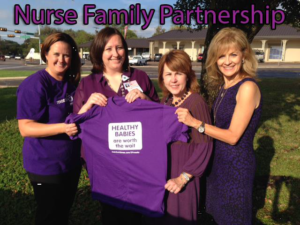 One of the members of the Healthy Babies Coalition working on these goals is Nurse Family Partnership (NFP). These loyal nurses of NFP are concerned above all about the relationships between mothers, children, and nurses. They are now performing home visits in Waco for first time mothers who qualify for these benefits. The goals of the partnership are to improve pregnancy outcomes, improve child health and cognitive development, and improve economic self-sufficiency. These nurses want to serve the moms and children of Waco in their home environments where they are the most comfortable. Not only does this eliminate the money and time of traveling for the new moms, but it also allows the nurses to teach and guide moms in an intimate setting through healthy pregnancies, labor, delivery, and motherhood.
One of the members of the Healthy Babies Coalition working on these goals is Nurse Family Partnership (NFP). These loyal nurses of NFP are concerned above all about the relationships between mothers, children, and nurses. They are now performing home visits in Waco for first time mothers who qualify for these benefits. The goals of the partnership are to improve pregnancy outcomes, improve child health and cognitive development, and improve economic self-sufficiency. These nurses want to serve the moms and children of Waco in their home environments where they are the most comfortable. Not only does this eliminate the money and time of traveling for the new moms, but it also allows the nurses to teach and guide moms in an intimate setting through healthy pregnancies, labor, delivery, and motherhood.
As a young mother, Andrea noticed that “There isn’t a class in school that tells you how to raise a kid. Nurse- Family Partnership is like an instruction book that gives you the knowledge and positive encouragement to raise a baby.”
Fathers are just as important as mothers in the pregnancy and child-rearing stages of life, and NFP honors the fathers of these families tremendously. Research shows that families who participate in NFP have a 68% increase in having a father in the household because this program knows the major benefits to fathers and children in that growing relationship.
As of this writing, the nurses in McLennan County plan to start visiting homes in January 2016. They are taking referrals for first time mothers who are due after March 10, 2016 and/or before the end of their 28th week of pregnancy. In addition, mothers must qualify for Medicaid or fall below 185% of the poverty line.
Nurse-Family Partnership of Waco is located at 120 Hillcrest Medical Boulevard #303, phone number 254-202-1130. Visit their website in English and Spanish at http://www.nursefamilypartnership.org/ to hear more personal stories and testimonies of the thankful mothers who have participated thus far and to connect with the program in Waco.
 Alyssa Holloway moved to Waco in August 2015 from Santa Barbara, California and loves her community. She is studying for her Masters in Social Work at Baylor University, and is working with the Healthy Babies Coalition at the Waco-McLennan County Public Health District. She enjoys baking, running, being outside, reading, laughing, going to church, and traveling.
Alyssa Holloway moved to Waco in August 2015 from Santa Barbara, California and loves her community. She is studying for her Masters in Social Work at Baylor University, and is working with the Healthy Babies Coalition at the Waco-McLennan County Public Health District. She enjoys baking, running, being outside, reading, laughing, going to church, and traveling.
The Act Locally Waco blog publishes posts with a connection to these aspirations for Waco. If you are interested in writing for the Act Locally Waco Blog, please email ashleyt@actlocallywaco.org for more information.
By Crystal Hernandez
Arthritis pain can be excruciating – it doesn’t have to be. We can help through EnhanceFitness®.
According to the Centers for Disease Control and Prevention, physical activity can reduce pain; improve function and emotional well-being in those suffering from arthritis. Programs, such as EnhanceFitness, have been approved by the CDC to help those with the disease.
EnhanceFitness is a 16-week program that meets three times each week. The curriculum helps participants to improve cardiovascular function, muscular strength and endurance, balance, range of motion and flexibility.
Instructors are able to work with all levels and abilities because both the cardiovascular and resistance training can be performed seated or standing. To alleviate the need to grasp weights with hands and fingers, which can be difficult and painful, wrist and ankle cuffs are used. These secure around the limbs and as the participant becomes stronger they can gradually increase the weight by ½ pound increments.
Assessments are performed at the start of the program and again at the end of the 16-week program. This allows participants to see the improvements that they’ve made in their fitness.
EnhanceFitness classes require registration and can hold 15-25 participants. Classes are held at both the Doris Miller Family YMCA and the Waco Family YMCA. It is free to YMCA members. For non-members it is $100 for the full 16 weeks. The next program will begin on April 4. For more information, contact Chronic Disease Prevention Specialist, Crystal Hernandez at 254-776-6612 or crystal.hernandez@ymcactx.org .
 This Act Locally Waco blog post was written by Crystal Hernandez. Crystal is the Chronic Disease Specialist for the Waco Family YMCA. She received her degree in Exercise Science and Health Promotion from the University of Memphis. She and husband Shawn are blessed to be the parents of 4 beautiful children. In her free time, she loves hitting the pavement and pounding out a good run.
This Act Locally Waco blog post was written by Crystal Hernandez. Crystal is the Chronic Disease Specialist for the Waco Family YMCA. She received her degree in Exercise Science and Health Promotion from the University of Memphis. She and husband Shawn are blessed to be the parents of 4 beautiful children. In her free time, she loves hitting the pavement and pounding out a good run.
The Act Locally Waco blog publishes posts with a connection to these aspirations for Waco. If you are interested in writing for the Act Locally Waco Blog, please email ashleyt@actlocallywaco.org for more information.
By Meilana Charles
The Super Bowl is America’s most watched national sporting event. On Super Bowl 50 Sunday, Feb. 7, 2016, there will be lots of game day socializing that may include drinking. That’s why the Cooperative Extension Program of Prairie View A&M University and Texas A&M AgriLife Extension Service “Watch UR BAC” program is urging football fans to call the play now: Drinking OR driving. If you plan on drinking on Super Bowl Sunday, designate a sober driver to get you home safely.
“Drunk driving is completely preventable,” said Texas A&M AgriLife Extension Service agent Colleen Follen “All it takes is a little planning. We want fans to remember that it’s a choice — drink or drive, but never do both. Law enforcement agencies will be out in large numbers to stop anyone who makes the dangerous decision to drive impaired.”
According to the Texas Department of Transportation, 1,041 people were killed in drunk-driving crashes in 2014, accounting for 29 percent of the total motor vehicle traffic fatalities in Texas. Super Bowl Sunday is a risky day for drunk-driving crashes.The “Watch UR BAC” program advises that if you’re attending a Super Bowl party or watching the game at a sports bar or restaurant:
- Designate your sober driver, or plan another way to get home safely before the party begins.
- If you don’t have a designated driver, then ask a sober friend for a ride home; or call a cab, friend or relative to come and get you. If you are at a friend’s house, stay the night.
- Never let friends drive if they have had too much to drink.
If you’re hosting a Super Bowl party:
- Make sure all your guests have a non-drinking driver to take them home, or arrange for alternate transportation to see that they get home safely.
- Serve plenty of food and non-alcoholic drinks at the party.
- Host your party just like they do at the stadium. Stop serving alcohol at the end of the third quarter of the game, and begin serving coffee and dessert.
- Take the keys away from anyone who has had too much to drink.
- Remember, you can be held liable and prosecuted if someone you served ends up in a drunk- driving crash.
Cooperative Extension Program of Prairie View A&M University and Texas A&M AgriLife Extension Service’s Watch UR BAC program is a free, statewide program to promote alcohol awareness, the dangers of impaired driving, and friends watching out for friends. Contact ldmooney@ag.tamu.edu for booking information.
 This Act Locally Waco blog post was written by Meilana Charles. Meilana is a Family and Consumer Sciences Extension Agent at Cooperative Extension Program at Prairie View A&M University. Meilana’s priority areas for providing educational resources to McLennan County are general nutrition, money management and parenting. She has a M.S. in Child Development from Texas Woman’s University and is a certified Human Development and Family Studies professional through American Association of Family and Consumer Sciences.
This Act Locally Waco blog post was written by Meilana Charles. Meilana is a Family and Consumer Sciences Extension Agent at Cooperative Extension Program at Prairie View A&M University. Meilana’s priority areas for providing educational resources to McLennan County are general nutrition, money management and parenting. She has a M.S. in Child Development from Texas Woman’s University and is a certified Human Development and Family Studies professional through American Association of Family and Consumer Sciences.
The Act Locally Waco blog publishes posts with a connection to these aspirations for Waco. If you are interested in writing for the Act Locally Waco Blog, please email ashleyt@actlocallywaco.org for more information.
by Courtney Restivo Wollard
The City of Waco is preparing to be designated as a Smoke Free City in January. As an advocate for health, I felt it was time to discuss this ordinance and the positive impact it will have on our city and its residents.
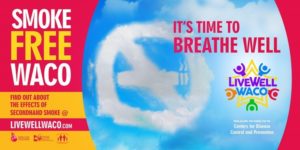 First of all, smoke free laws are not a new concept. In fact, as of July 2015, twenty-six states and 763 municipalities in the U.S. have placed bans on smoking in restaurants and bars as well as non-hospitality workplaces. These laws are being implemented all over the country and all over the world. Ninety-two nations have enacted some sort of 100% smoke free law, sixty-two of those laws include both restaurants and bars. On October 1, 2015, it became illegal to smoke in vehicles with those under the age of 18 in England and Wales. The Texas statewide ban has stalled, but numerous cities in Texas are taking action and enacting their own smoking bans including Robinson, Woodway and soon Waco.
First of all, smoke free laws are not a new concept. In fact, as of July 2015, twenty-six states and 763 municipalities in the U.S. have placed bans on smoking in restaurants and bars as well as non-hospitality workplaces. These laws are being implemented all over the country and all over the world. Ninety-two nations have enacted some sort of 100% smoke free law, sixty-two of those laws include both restaurants and bars. On October 1, 2015, it became illegal to smoke in vehicles with those under the age of 18 in England and Wales. The Texas statewide ban has stalled, but numerous cities in Texas are taking action and enacting their own smoking bans including Robinson, Woodway and soon Waco.
Do you remember when it was legal to smoke on airplanes? I’m a little too young to remember that, but I do notice the ‘No Smoking’ signs on airplanes today and know the history. It has been 25 years since smoking was banned on airplanes and now there is an entire generation that could not even imagine smoking on an airplane. That’s a huge accomplishment for public health! The City of Waco smoke free ordinance will contribute to another generation not knowing what it was like for smoking to be allowed in indoor workplaces, including restaurants and bars along with bingo and pool halls.
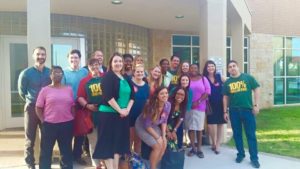 Second, it is a known fact that secondhand smoke causes disease and premature death for nonsmokers. Countless studies published by leading health agencies have affirmed that secondhand smoke is a completely preventable cause of death. According to the 2006 U.S. Surgeon General, there is “no safe level of secondhand smoke exposure and the only way to ensure health protection is a 100% smoke free environment.”
Second, it is a known fact that secondhand smoke causes disease and premature death for nonsmokers. Countless studies published by leading health agencies have affirmed that secondhand smoke is a completely preventable cause of death. According to the 2006 U.S. Surgeon General, there is “no safe level of secondhand smoke exposure and the only way to ensure health protection is a 100% smoke free environment.”
Smoke Free laws are designed to protect the public health and welfare of the community from health hazards such as heart disease, various cancers, stroke, and respiratory infections induced by breathing in secondhand smoke.
 There are several health benefits that we should see with this new smoke free ordinance. The ordinance will reduce exposure to secondhand smoke and produce a drop in ER visits due to heart and asthma related issues. Heart disease is the leading cause of death in the nation for men and women. Smoke free environments have been shown to decrease the rate of heart disease. Smoke free laws move us in the right direction – hopefully soon heart disease will no longer being the number one killer of Americans. These laws will also encourage people to quit smoking and prevent youth from starting to smoke; this will ultimately reduce the number of smoking related deaths.
There are several health benefits that we should see with this new smoke free ordinance. The ordinance will reduce exposure to secondhand smoke and produce a drop in ER visits due to heart and asthma related issues. Heart disease is the leading cause of death in the nation for men and women. Smoke free environments have been shown to decrease the rate of heart disease. Smoke free laws move us in the right direction – hopefully soon heart disease will no longer being the number one killer of Americans. These laws will also encourage people to quit smoking and prevent youth from starting to smoke; this will ultimately reduce the number of smoking related deaths.
Essentially, our community will be healthier, happier and will continue to prosper after this ordinance goes into effect.
I am very excited to soon be living in a designated smoke free city! I applaud the City of Waco for taking this step towards protecting the health of its residents in order to have a prosperous Waco!
 Courtney Restivo Wollard is a lifelong Waco resident who works as Lead Health Services Coordinator at the Waco-McLennan County Public Health District. She serves as Chair for the Live Well Waco/Obesity Working Group of the Prosper Waco Health Committee. She is also an alumnus of the Waco Foundation LeadershipPLENTY Institute. Courtney graduated with her Masters of Public Health from Baylor University and right away began her career as a health advocate. She is married to Kyle. They have a Chihuahua and a Labrador retriever and are in the midst of building their dream home. Courtney hopes to continue to help create a healthier environment for McLennan County residents filled with healthy eating and physical activity opportunities.
Courtney Restivo Wollard is a lifelong Waco resident who works as Lead Health Services Coordinator at the Waco-McLennan County Public Health District. She serves as Chair for the Live Well Waco/Obesity Working Group of the Prosper Waco Health Committee. She is also an alumnus of the Waco Foundation LeadershipPLENTY Institute. Courtney graduated with her Masters of Public Health from Baylor University and right away began her career as a health advocate. She is married to Kyle. They have a Chihuahua and a Labrador retriever and are in the midst of building their dream home. Courtney hopes to continue to help create a healthier environment for McLennan County residents filled with healthy eating and physical activity opportunities.
The Act Locally Waco blog publishes posts with a connection to these aspirations for Waco. If you are interested in writing for the Act Locally Waco Blog, please email ashleyt@actlocallywaco.org for more information.
References:
U.S. smoking bans –
World smoking bans –
- http://www.no-smoke.org/pdf/internationalbarsandrestaurants.pdf
- http://www.bbc.com/news/world-11845158
Smoking ban in vehicles in England/Wales –
- https://www.gov.uk/government/publications/new-rules-about-tobacco-e-cigarettes-and-smoking-1-october-2015/new-rules-about-tobacco-e-cigarettes-and-smoking-1-october-2015
- http://www.inquisitr.com/2342320/smoking-in-cars-with-children-illegal-starting-october-1st-2015/
Smoking ban on airplanes –
Benefits –
- http://www.cdc.gov/tobacco/data_statistics/fact_sheets/secondhand_smoke/protection/improve_health/
- http://www.acscan.org/pdf/tobacco/reports/acscan-smoke-free-laws-report.pdf
By Kiera Collins
Y.E.S. (Youth Empowerment Services) is a Medicaid waiver program. The purpose of Y.E.S. is to keep at-risk youth who are in danger of out of home placement or inpatient psychiatric treatment in the home with the family unit. I am a behavior specialist at Klaras Center for Families. As a behavior specialist, I tutor and mentor my assigned clients, many of whom participate in the Y.E.S. program.
The Y.E.S. program is 12 months long. In those 12 months we work on school issues, learning deficits, vital skills, goal setting, seeking natural supports, communication skills, coping mechanisms, safety plans, and many specially designed undertakings that will benefit the family unit as a whole. Our goal is to empower the family and give them a better foundation to build upon.
These goals are accomplished by providing community based services for the child and parent. Some of those services include art therapy, equine therapy, recreational therapy, adaptive aides, community living specialists, and family support specialists.
I have been able to make community contacts with Angie Veracruz from Central Texas Artists Collective (CTAC), Cherie Hudson at The Cutting Edge Salon and Spa, William McKeever at D20 prints, and Brazos Books. Ms. Veracruz provides our clients with bi-weekly art sessions. Ms. Hudson provided four deserving parents with donated services to promote self-care. Mr. McKeever provided wood block t-shirt printing sessions, and Brazos Books offered a discount on the books we purchased. We have also received donated books from Half Price Books and I ran a successful book drive with Usborne books.
We have been able to provide better services, activities, and support to our clients at Klaras Center for Families in part due to the Y.E.S. waiver program and in part due to the community support that we have received. It is important to encourage our clients by showing them that they have a team of people that want them to succeed. In 12 months we can transform a life and give a family hope for the future.
 Kiera Collins, born and raised in New Orleans, La., is a behavior specialist at Klaras Center for Families. She is a lover of words and all things weird. She is a writer, poet, and artist that spends her days thinking creatively and outside the box. Follow her blog: www.lessonsattheranch.wordpress.com .
Kiera Collins, born and raised in New Orleans, La., is a behavior specialist at Klaras Center for Families. She is a lover of words and all things weird. She is a writer, poet, and artist that spends her days thinking creatively and outside the box. Follow her blog: www.lessonsattheranch.wordpress.com .
The Act Locally Waco blog publishes posts with a connection to these aspirations for Waco. If you are interested in writing for the Act Locally Waco Blog, please email ashleyt@actlocallywaco.org for more information.
by Meilana Charles
November is National Prematurity Awareness Month and Tuesday, November 17th is World Prematurity Day. This month, individuals, groups and organizations around the world will provide information on the impact of early births on babies and their families.
What is Premature Birth? According to the Center for Disease Control and Prevention (2013) a baby born at 40 weeks is defined as full term, however, if born 3 weeks prior to its due date the baby is considered premature.
The March of Dimes states that 15 million babies are born prematurely worldwide each year (March of Dimes, 2013). In the U.S., one in every nine babies or about 450,000 babies a year are born premature (March of Dimes, 2013). In Texas 12.3% of babies were born premature. Of those percentages, African-American women were more likely to deliver a premature baby regardless of her age, income and education level (Unnatural Causes, 2008). Health Implications associated with premature births include:
- Feeding and digestive problems
- Breathing problems such as Respiratory Distress Syndrome
- Severe infections
- Jaundice
- Brain injury
- Retinopathy
- Anemia
- Hearing Loss
- Cerebral palsy
- Intellectual disabilities later in life
But there is good news! In 2013, thanks to the collaborative efforts of several organizations, premature deliveries have declined to just 11.4 % nationwide. However, there’s still a long way to go. With all the workshops and resources available, it’s still up to the individual to work toward decreasing the likelihood of a premature birth. Here are some ways individuals can decrease the possibility of premature labor:
Preconception Health – Prior to pregnancy women and men alike should visit with a primary care physician in preparation for the pregnancy. They should also continue eating healthy, maintain a physical activity routine, research family health history, update necessary immunizations, reduce stress and avoid products containing alcohol, tobacco and recreational drugs. Additionally, women should take a multivitamins that includes at least 400 mg. of Folic Acid.
 Early Prenatal Care – As soon as pregnancy is suspected, a doctor’s appointment should be scheduled. This will confirm pregnancy and a due date. A physical exam, ultrasound and several tests may be ordered, and a family health history will be taken. The earlier prenatal appointments begin, the more the probability of prenatal and fetal complications that can lead to premature births can be reduced.
Early Prenatal Care – As soon as pregnancy is suspected, a doctor’s appointment should be scheduled. This will confirm pregnancy and a due date. A physical exam, ultrasound and several tests may be ordered, and a family health history will be taken. The earlier prenatal appointments begin, the more the probability of prenatal and fetal complications that can lead to premature births can be reduced.
Watch your Weight – Moms should eat a balanced diet with the appropriate amounts of folic acid, iron, calcium, vitamin D and mineral while avoiding seafood high in mercury. Primary care physicians will work with pregnant moms to develop an appropriate eating and physical activity plan. This may decrease unhealthy weight gain or preventable diseases, both of which can negatively contribute to premature deliveries.
No Stress – Prenatal stress during pregnancy has been associated with miscarriages, premature births and low weight. Additionally, behavioral and emotional difficulties later in life can be attributed to stressful pregnancies. That is why it’s important to find suitable coping strategies to avoid or limit stressful situations.
Food Safety – Although rarely discussed, bacteria such as listeria, toxoplasmosis, salmonella, and campylobacter can severely impact a pregnancy. Exposure may lead to premature birth, birth defects, later learning disabilities and even intrauterine or infant death. To avoid the likelihood of ingesting harmful bacteria, follow the 4 principle of food safety: clean, separate, cook and chill. Click on the link for more information on the food safety principles: http://homefoodsafety.org/food-poisoning/four-easy-steps
The prevalence of premature births is a worldwide epidemic impacting families and communities. However, with access to preventative care, resources and information, families can become aware its lifelong implications and take steps to have happy, healthy full-term babies.
 This Act Locally Waco blog post was written by Meilana Charles. Meilana is a Family and Consumer Sciences Extension Agent at Cooperative Extension Program at Prairie View A&M University. Meilana’s priority areas for providing educational resources to McLennan County are general nutrition, money management and parenting. She has a M.S. in Child Development from Texas Woman’s University and is a certified Human Development and Family Studies professional through American Association of Family and Consumer Sciences.
This Act Locally Waco blog post was written by Meilana Charles. Meilana is a Family and Consumer Sciences Extension Agent at Cooperative Extension Program at Prairie View A&M University. Meilana’s priority areas for providing educational resources to McLennan County are general nutrition, money management and parenting. She has a M.S. in Child Development from Texas Woman’s University and is a certified Human Development and Family Studies professional through American Association of Family and Consumer Sciences.
The Act Locally Waco blog publishes posts with a connection to these aspirations for Waco. If you are interested in writing for the Act Locally Waco Blog, please email ashleyt@actlocallywaco.org for more information.
Sources:
Academy of Nutrition and Dietetics. Four easy steps. http://homefoodsafety.org/food-poisoning/four-easy-steps
Center for Disease Control and Prevention. (2014). Preconception health and health care-Information for men. http://www.cdc.gov/preconception/men.html
Center for Disease Control. (2014). Preconception health and health care-Planning for pregnancy. http://www.cdc.gov/preconception/planning.html
Center of Disease Control and Prevention. (2013). National Prematurity Awareness Month-What is premature births? http://www.cdc.gov/Features/PrematureBirth/
California Newsreel. (2008). Unnatural causes: Is inequality making us sick? http://www.unnaturalcauses.org/about_the_series.php
March of Dimes. (2012). Born too soon: The global action report on preterm birth. http://www.marchofdimes.org/materials/born-too-soon-the-global-action-report-on-preterm-birth.pdf
March of Dimes. (2014). Texas premature report card. https://www.marchofdimes.org/peristats/pdflib/998/premature-birth-report-card-Texas.pdf
March of Dimes. (2014). U.S. premature birth report card. http://www.marchofdimes.org/materials/premature-birth-report-card-united-states.pdf
by Crystal Hernandez
Imagine you’re driving down the road. You see a sign that the bridge up ahead is closed. You decide moving forward along this path is not safe, so you choose a different route. What if your body is displaying signs the road ahead is not safe? Do blood tests reveal your glucose levels are above the normal range? Are you sedentary and above your healthy body weight? Are you seeing indications that you’ll develop type 2 diabetes and other health problems if you continue along this path? The YMCA can help you map out a new route toward a healthier future. The YMCA’s Diabetes Prevention Program helps those at high risk of developing type 2 diabetes adopt and maintain healthy lifestyles by eating healthier, increasing physical activity and losing a modest amount of weight in order to reduce their chances of developing the disease.
The number of Americans with diabetes is 29.1 million. That’s a big number, but even bigger is the number of Americans that have prediabetes: 86 million. But only 10% of those know of their risk status. Without weight loss and moderate physical activity, 15% to 30% of people with prediabetes will develop type 2 diabetes within 5 years.
Diabetes is the leading cause of kidney failure, nontraumatic lower limb amputations, and new cases of blindness among adults in the U.S. The risk for stroke and heart attack is 2-4 times higher in individuals with diabetes. The disease accounts for 17% of all deaths for adults older than 25. If dollar signs impact you more, let me share with you what that might look like. The average annual out-of-pocket medical cost for someone without diabetes is about $3,670. However, for the person with diabetes and its related medical conditions, that cost could be more than $17,000!
Maybe that’s the motivation you need to see where your body’s GPS is leading you. If so, schedule a visit with your doctor. Simple blood tests can tell you whether you need to turn around and take a different route by enrolling in the YMCA’s Diabetes Prevention Program. Results from blood tests that are in the prediabetes range, (tests include A1-C or fasting glucose),or a previous diagnosis of gestational diabetes will qualify you for the program. You must have a BMI of 25 or higher and be over the age of 18 to participate. If you are unable to access a blood test, take the risk quiz to find out whether you are at high risk. Individuals who score a 9 or higher on the risk quiz are also eligible for the program.
The YMCA’s Diabetes Prevention Program uses a Center for Disease Control (CDC) -approved curriculum and is part of the CDC-led National Diabetes Program. The 12-month program is facilitated by a trained lifestyle coach that helps you and other classmates begin to make the changes needed to reduce your risk of developing diabetes. The program focuses on helping participants reduce their body weight by 7% and increase their physical activity to at least 150 minutes per week. Cost for the whole 12-month program is $429. Click here for a flyer.
If you’re ready to change the direction of your health, the YMCA can help. For more information on when the next session will begin, contact Chronic Disease Prevention Specialist Crystal Hernandez at (254) 776-6612 or crystal.hernandez@ymcactx.org.
 This Act Locally Waco blog post was written by Crystal Hernandez. Crystal is the Chronic Disease Specialist for the Waco Family YMCA. She received her degree in Exercise Science and Health Promotion from the University of Memphis. She and husband Shawn are blessed to be the parents of 4 beautiful children. In her free time, she loves hitting the pavement and pounding out a good run.
This Act Locally Waco blog post was written by Crystal Hernandez. Crystal is the Chronic Disease Specialist for the Waco Family YMCA. She received her degree in Exercise Science and Health Promotion from the University of Memphis. She and husband Shawn are blessed to be the parents of 4 beautiful children. In her free time, she loves hitting the pavement and pounding out a good run.
The Act Locally Waco blog publishes posts with a connection to these aspirations for Waco. If you are interested in writing for the Act Locally Waco Blog, please email ashleyt@actlocallywaco.org for more information.
DISCLAIMER: [YMCA] and the National Council of Young Men’s Christian Association of the United States of America (“YMCA of the USA”) have made a commitment to collaborate with the nation’s YMCAs on efforts to support a national movement to increase awareness and take measures to prevent diabetes and its complications among groups at risk, and to help support treatment outcomes for individuals who have confirmed diagnoses or indications of prediabetes by promoting an effective lifestyle change. YMCA of the USA nor any YMCA offering the YMCA’s Diabetes Prevention Program warrants or guarantees any specific outcomes for program participants with respect to diabetes prevention.]
by Kaylyn Schultz
I’m a big believer in the idea of “loving where you live”. Not just ‘liking’ where you live but loving it—loving the city, its spirit, and its people. Loving on the people (those amazing fellow Wacoans) and helping out those people in any way one can—whether it be mighty and life changing or the little everyday random acts of kindness. This summer I had the incredible opportunity to help our city and some of its people in my own way. It was a blessing and a wonderful, eye-opening experience. I was given an internship at the Waco-McLennan County Public Health District.
Now I saw pictures of some of the more exotic places my friends went off to for their internships (*cough cough* HAWAII.) and may have sighed once or twice with longing after that more glamorous summer life. However, staying in Waco, Texas, was definitely the best fit for me and for a couple reasons. One, I had to take a British Literature class and being in the same city as your class is usually a good plan to accomplish said class. And two, I really wanted to learn what my city and its people needed from a health standpoint. Let me tell you: I got a good picture.
I got to work on a few projects in my internship. I was in charge of running all social media platforms for the Health district (Cue shameless plug. Go ‘like’ the Health District on Facebook!) and updating their website for Live Well Waco (check that one out too. It’s pretty awesome). I got to have so much fun and learned a ton about reaching out to people and getting their attention. I was also a part of the Health district’s Our Children, Their Nutrition team. This program, OCTN, was created to bring nutrition education to children ages 8-12 years old. This is a crucial age and we want them to be armed with a full arsenal of nutrition knowledge so they may make the smartest choices concerning food. We taught kids detailed nutrition information and tips like the amino acids in protein, the different kinds of carbohydrates and fats, and to check the color of their urine in order to see how hydrated they are! [That last one really seemed to stick with them all for some reason!] I was also fortunate enough to help out with the 8 Week Zumba Challenge!—I have consequently discovered that I really love Zumba and want to become an instructor. I gave a short nutrition lesson before the workouts started and tied in how these parents can take it home to their kids and stop poor dietary habits before 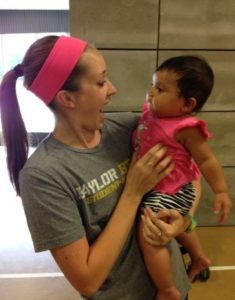 they begin. I also got to hold some babies while their awesome mommas got to work out and I didn’t mind one bit.
they begin. I also got to hold some babies while their awesome mommas got to work out and I didn’t mind one bit.
And I loved it all.
I was all over Waco, sometimes all in one day, teaching nutrition and health and spreading awareness for exciting opportunities to improve people’s wel-lbeing. I got to experience some awesome things. But also some not so awesome things.
I loved teaching the kids for OCTN. They are absolutely hilarious. That time frame of life, 8-12 years, is certainly an interesting time. At 8 years old they are DESPERATE to be called on. They want to answer a question. They’ll raise their hands even if they have absolutely nothing to say. They just want to show they are making the effort. It is so sweet and they still give hugs! At 9-10 years old, they learn SO quickly. They grasp the scientific side of nutrition well and ask further questions. (One time, we were asked how salt is made. Uhhh… Mind blown.) They don’t want to be considered young like the 8 year olds and they look up to the 11-12 year olds. Then… something terribly scary happens. They want to be “cool”. Desperately. [Dun Dun Dahhhhh!] Our beautiful, funny, sassy, intelligent 11 and 12 year olds just wanted to look cool in front of their friends. And, unfortunately, answering our questions and being respectful isn’t what the ‘cool’ kids are doing. These kiddos were by far the most challenging. But they certainly gave me the best stories.
On DAY ONE, a 12 year old boy said to his friends as I walked away (and so he apparently thought out of earshot) that I am “hot”. Ladies, haven’t you always dreamed of being called ‘hot’ by a twelve year old?? Dreams coming true here folks. Another day, while I was actually leading the lesson on dietary fats, one 11 year o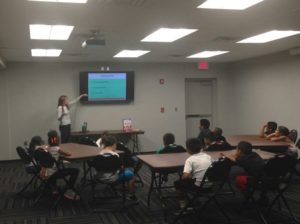 ld boy winked at me as I walked up to his table. Oy vey. I swiftly kicked him out. Now, I can appreciate the hilarity of this ‘compliment’ of sorts perhaps in another situation. Though maybe not one in which I am in a teaching position and am 10 years older than the giver of the wink. All of this was explained to him and he was allowed back in for the snack. [*cue awkward eye contact here*] You’d think he expected me to thank him. How are 11 year old boys so confident?? I had to talk to some of my guy friends here in Waco to attempt to glean some sort of understanding into the 11 & 12 year old male mind… as you may imagine I did not have much luck. They don’t even understand their own minds is the best I could come up with.
ld boy winked at me as I walked up to his table. Oy vey. I swiftly kicked him out. Now, I can appreciate the hilarity of this ‘compliment’ of sorts perhaps in another situation. Though maybe not one in which I am in a teaching position and am 10 years older than the giver of the wink. All of this was explained to him and he was allowed back in for the snack. [*cue awkward eye contact here*] You’d think he expected me to thank him. How are 11 year old boys so confident?? I had to talk to some of my guy friends here in Waco to attempt to glean some sort of understanding into the 11 & 12 year old male mind… as you may imagine I did not have much luck. They don’t even understand their own minds is the best I could come up with.
While some lessons left me laughing and shaking my head in wonder, others left me somewhat heartbroken. One day, at one of our three locations, I was tying a braided yarn bracelet this little lady had made in our activity part of the lesson that day. She looked up at my face and asked if I was wearing makeup, to which I replied “Yes, some mascara.” She then told me that she likes “the stuff that makes your skin lighter”. I asked if she meant foundation, the stuff that makes skin all even toned. She said yes… because she doesn’t like the color of her skin, it’s “too dark” she said. This sweet, beautiful, incredible, smart little girl told me she wished her skin was lighter. I needed a moment. I then told her that makeup like that is for hiding things and she had absolutely nothing to hide. I told her that her skin is beautiful, smooth, flawless. Now why in the world wasn’t she hearing this every day at home? Why??? We, unfortunately, are surrounded by things telling us, especially women and young girls, to compare ourselves to others, that the way we are just isn’t quite good enough. Improving ourselves in order to be healthier is one thing, disliking how God made us is another matter entirely. Negativity is everywhere. However, something I will take from these beautiful, fun-loving kiddos is, no matter what’s going on in my personal life or in the stress behind the scenes, I can still be happy, positive, and kind to those around me. I’ve learned that whether someone is struggling with their weight, causing chronic health issues or if their struggle is on the inside and they’re dealing with something along the spectrum of mental health, we can all be kind, take it seriously, and be aware of what a simple encouraging word can do for someone. I’ve learned how important education and spreading the word about the importance of being active every day are. I’ve learned how I can help people to learn how important it is to really understand the food we put in our bodies. And I’ve learned it doesn’t take too much to begin to make a difference.
It starts with kindness and encouragement. Throw in some fun, maybe versatile nutrition education, and some opportunities to come together and get active. We may just end up with a healthier, happier Waco for generations to come. I’m so thankful to the Public Health District and can’t wait to start the rest of my life, helping people, and trying to make a positive difference in their well-being.
Lots of love to you beautiful people.
 This Act Locally Waco blog post was written by Kaylyn Schultz. Kaylyn is originally from Celina, Tx and is going into her senior year at Baylor University, majoring in Health Science Studies. After graduating in May of 2016 she plans to begin working toward obtaining her Master’s degree in Public Health. Kaylyn is also a high jumper for the Baylor Track and Field team and loves the challenge, teammates, discipline, and Christian atmosphere being a part of such an incredible team provides. Kaylyn can usually be found reading any book she can get her hands on or watching movies with friends, her stupendous little sister, Lauren, or her wonderful and supportive boyfriend, Marcus. Her main goal for her future career is to decrease the prevalence of obesity and resulting chronic disease in our nation and thus improve quality of life for millions of children and adults.
This Act Locally Waco blog post was written by Kaylyn Schultz. Kaylyn is originally from Celina, Tx and is going into her senior year at Baylor University, majoring in Health Science Studies. After graduating in May of 2016 she plans to begin working toward obtaining her Master’s degree in Public Health. Kaylyn is also a high jumper for the Baylor Track and Field team and loves the challenge, teammates, discipline, and Christian atmosphere being a part of such an incredible team provides. Kaylyn can usually be found reading any book she can get her hands on or watching movies with friends, her stupendous little sister, Lauren, or her wonderful and supportive boyfriend, Marcus. Her main goal for her future career is to decrease the prevalence of obesity and resulting chronic disease in our nation and thus improve quality of life for millions of children and adults.
The Act Locally Waco blog publishes posts with a connection to these aspirations for Waco. If you are interested in writing for the Act Locally Waco Blog, please email ashleyt@actlocallywaco.org for more information.
by Meilana Charles
With the weather in McLennan County regularly reaching 90 degrees or higher, staying hydrated is essential. Unfortunately for many people staying hydrated means the overconsumption of fruit juices or drinking sugary-carbonated beverages because water may lack a desired flavor.
Well, there’s a simple solution: Infused Water.
Infused Water is the combination of water with fresh fruits and herbs. For the past year I’ve been hooked on Infused Water. I’ve discussed the different recipes I’ve tried informally with several local groups, and I even created a mini-program about the benefits of drinking infused water that was presented at Restoration Haven, a local community ministry located in the Estella Maxey Public Housing complex, last year. Even children at several summer day camps have noticed the “leaves” (mint) floating around in my water.
I can’t take all the credit for my yummy discovery. Infused Water has been used as a refreshing drink in several cultures. According to Basu (2014), Infused Water may be a derivative of Aguas Frescas, a flavored drink popular in the Caribbean and in Central and South American countries.
Not only is Infused Water refreshing, it’s also healthy. Danielle Hairston-Greene, a Program Specialist with the Cooperative Extension Program wrote in her “What’s on My Plate” blog that, “There are many health benefits of infused water including appetite control, hydration, immune defense, heartburn prevention, blood sugar regulation and weight management.” Hairston-Greene even provided several combinations with their specific health benefits.
 Preparation of Infused Water is relatively easy. Once you decide which recipe to use simply cut up the fruit than use a fruit squeezer to extract the juice leaving the pulp. Next, add the juice to filtered water than let it sit overnight. I personalize my creations with fresh Ginger Root and Mint.
Preparation of Infused Water is relatively easy. Once you decide which recipe to use simply cut up the fruit than use a fruit squeezer to extract the juice leaving the pulp. Next, add the juice to filtered water than let it sit overnight. I personalize my creations with fresh Ginger Root and Mint.
Alternatively, some people prefer to cut up their fruits and add then them to the water. Infusion water bottles are also popular.
So the next time the Texas summer heat has you thirsty, pass on the soda, skip the sugar and use your imagination to think up a refreshing and nourishing Infused Water recipe for you and your family to fall in love with.
 This Act Locally Waco blog post was written by Meilana Charles. Meilana is a Family and Consumer Sciences Extension Agent at Cooperative Extension Program at Prairie View A&M University. Meilana’s priority areas for providing educational resources to McLennan County are general nutrition, money management and parenting. She has a M.S. in Child Development from Texas Woman’s University and is a certified Human Development and Family Studies professional through American Association of Family and Consumer Sciences.
This Act Locally Waco blog post was written by Meilana Charles. Meilana is a Family and Consumer Sciences Extension Agent at Cooperative Extension Program at Prairie View A&M University. Meilana’s priority areas for providing educational resources to McLennan County are general nutrition, money management and parenting. She has a M.S. in Child Development from Texas Woman’s University and is a certified Human Development and Family Studies professional through American Association of Family and Consumer Sciences.
The Act Locally Waco blog publishes posts with a connection to these aspirations for Waco. If you are interested in writing for the Act Locally Waco Blog, please email ashleyt@actlocallywaco.org for more information.
Sources:
- Basu, B. D. (2014). Beat the Heat by Gulping Fruit Infused Water Drink. Positive Health,(218),
- Hairston-Greene, D. (2014) The Health Benefits of Infused Water. What’s on My Plate blog.
By Crystal Hernandez
May 2, 2015. Pacquiao vs. Mayweather. Billed as the Fight of the Century, this matchup was expected to be the highest-grossing match in history. The revenue from pay-per-view purchases alone proved that it was. Some might argue that the fight was less than expected.
I’m here to tell you, though, a fight bigger transpires every day. Imagine you are standing in one corner of the ring. As your opponent climbs through the ropes, you find yourself eye to eye with cancer. That’s right. You’re up against the big “C.” That’s the fight of your life, but you don’t have to fight it alone. LIVESTRONG® at the YMCA is right beside you, gloves on and ready to help you overcome your opponent.
Punch one: Cancer steals your peace and rocks your world. Punch two: Cancer takes away your hair, your breast, your endurance, your stamina, your energy, and your self-esteem. Punch three: Cancer staggers your family, destroys your finances and leaves your head spinning while you’re clinging to the ropes with all you’ve got.
Advances in medicine help many claim victory. However, the battle leaves the champion black and blue, tired and broken. When the fight is over, supporters and fans move on, leaving survivors alone to figure out what happens next in their stories. In the quiet that follows, survivors are left searching for a “new” normal. LIVESTRONG at the YMCA can help.
LIVESTRONG at the YMCA steps in to be the Creed to your Rocky helping you reclaim your health and wellness. The free program improves endurance, stamina, strength, balance and flexibility. You find a new group of fans in the survivors that join you, and emotional healing occurs. The twice-a-week 90-minute sessions help develop better health through cardiovascular and weight machines, free weights, resistance bands and modified classes. Two specially trained instructors take you under their belts to show you the “ropes”.
Support continues after each 12-week session with LIVESTRONG at the YMCA Nights. Survivors and caregivers reunite with other participants and take part in fun activities, such as belly dancing, bunco and visits to the theater.
If you are a cancer survivor and would like more information about the next session, contact Chronic Disease Prevention Specialist Crystal Hernandez at (254) 776-6612 or crystal.hernandez@ymcactx.org. If you would like to show your support, sign up for the LIVESTRONG at the YMCA Race. The 4th annual event will be Oct. 3, 2015, at Woodway Park. Sign up for the 1K, 5K or 10K via Active.com or at the Welcome Desk at Waco Family YMCA. Sponsorship opportunities are available. Donations can be made directly to the Y to support the LIVESTRONG at the YMCA.
LIVESTRONG at the YMCA is our way of making sure no one fights cancer alone. When cancer throws a blow to you or a loved one, the Y can help pick you up, dust you off and give you the strength and endurance to come back swinging. Together, we can take back what cancer takes away.
 This Act Locally Waco blog post was written by Crystal Hernandez. Crystal is the Chronic Disease Specialist for the Waco Family YMCA. She received her degree in Exercise Science and Health Promotion from the University of Memphis. She and husband Shawn are blessed to be the parents of 4 beautiful children. In her free time, she loves hitting the pavement and pounding out a good run.
This Act Locally Waco blog post was written by Crystal Hernandez. Crystal is the Chronic Disease Specialist for the Waco Family YMCA. She received her degree in Exercise Science and Health Promotion from the University of Memphis. She and husband Shawn are blessed to be the parents of 4 beautiful children. In her free time, she loves hitting the pavement and pounding out a good run.
The Act Locally Waco blog publishes posts with a connection to these aspirations for Waco. If you are interested in writing for the Act Locally Waco Blog, please email ashleyt@actlocallywaco.org for more information.

